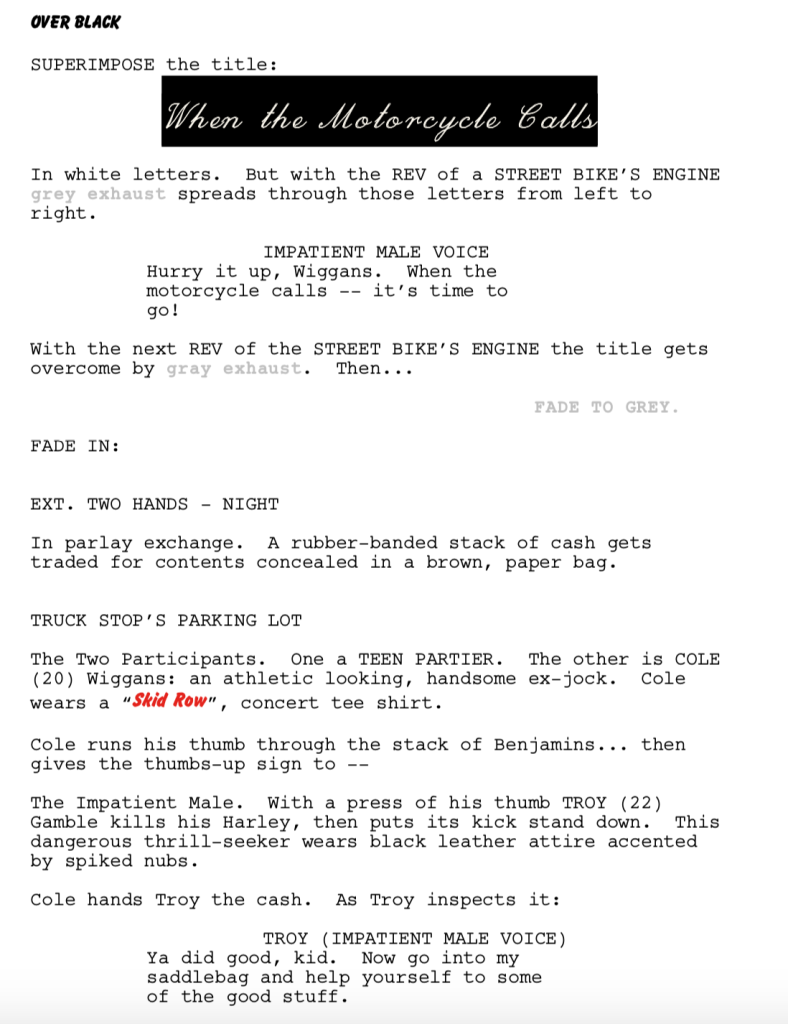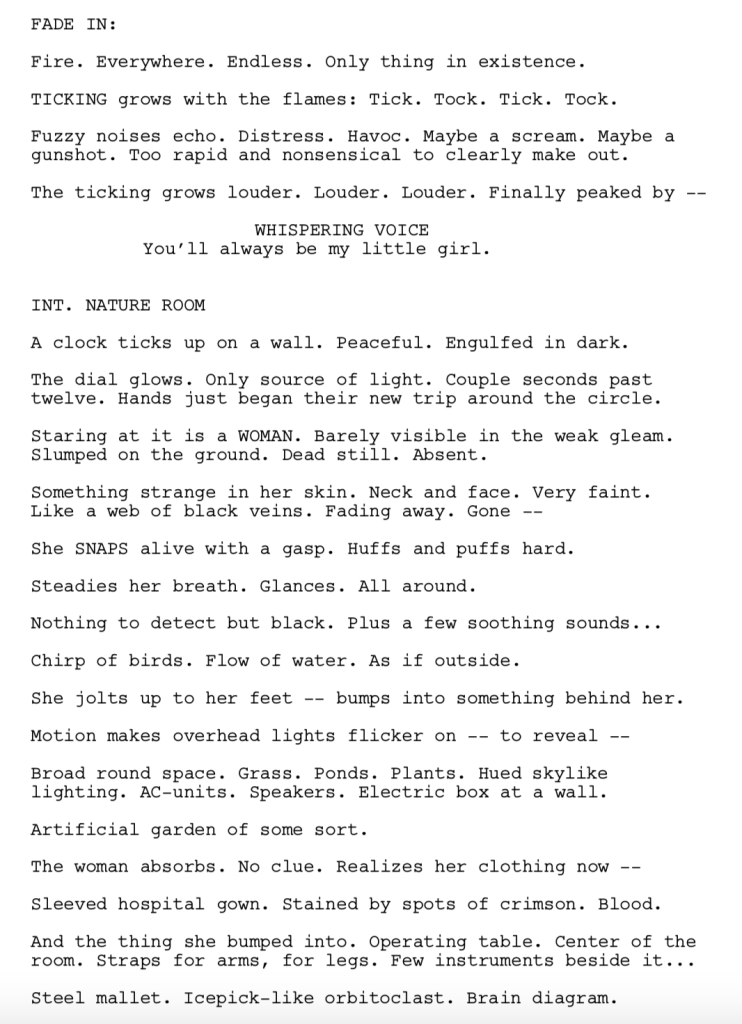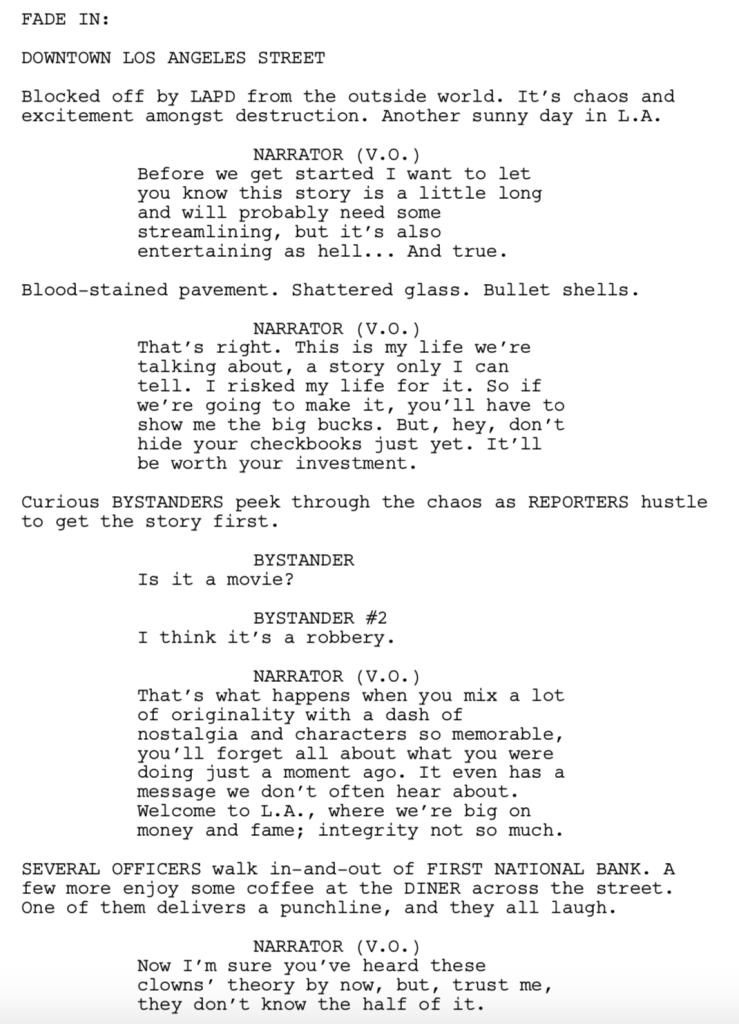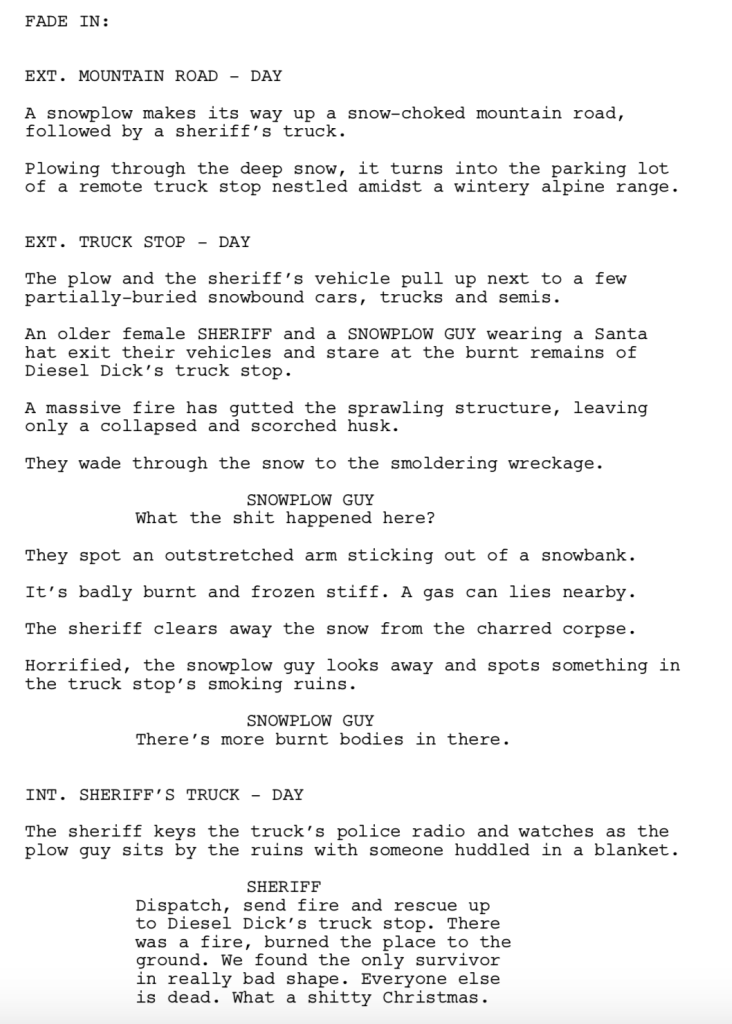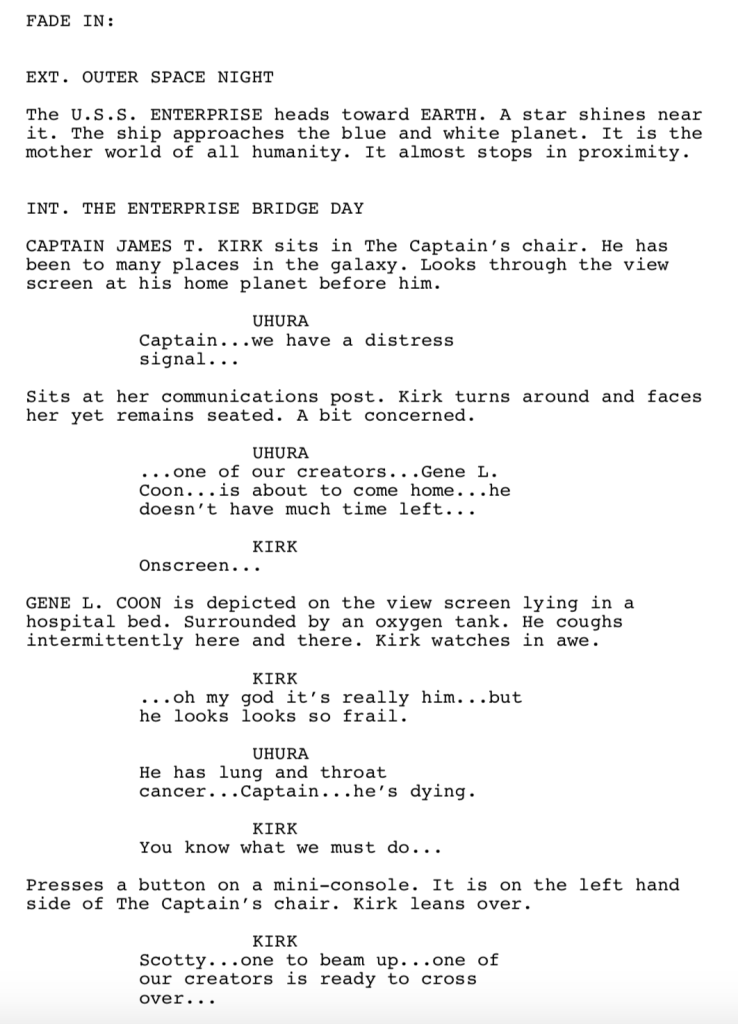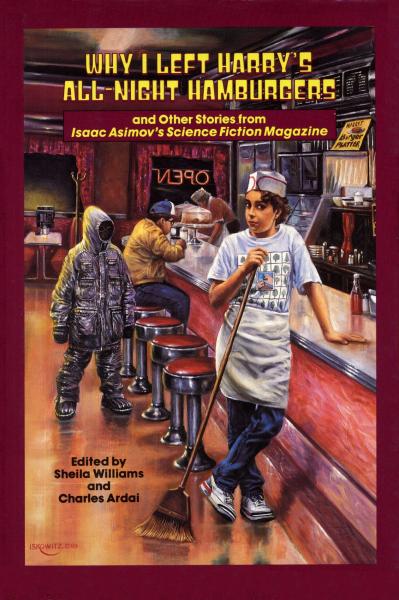Search Results for: the traveler
Genre: Thriller/Sci-Fi
Premise: (from Black List) When a man’s estranged wife gets lost inside of her own mind during an experimental procedure, he must navigate her subconscious to find her in the memories of their past.
About: Brett Treacy and Dan Woodward are new writers. They finished top 100 in 2017’s Launch Pad competition with a script called Trapline. Then last year they made the leap to the big time – the Black List, grabbing a respectable 14 votes. Brett Treacy was a production assistant on Westworld.
Writer: Brett Treacy & Dan Woodward
Details: 120 pages
There I was, 15 pages into In Retrospect, sweating bullets for the writers. In theory, these ideas are goldmines. They’re high concept. They’re exciting. They feel like a movie. In practice, they’re nightmares. I can confirm this from my own experiences as well as from reading similar scripts from other writers.
The problem lies within the rule set that governs the script’s mythology. The disparity between what you believe writing the script will be like (fun!) and what it’s actuality like (misery!) is so much bigger than anticipated, it gives way to a sort of surrender as the writing process goes on. It’s never fun when you realize a script is going to take five times as much effort as you anticipated. What am I talking about? Read on.
James, a photographer, gets a call from a mysterious scientist who says he needs him to come immediately. James’ ex-wife, Sloane, is in trouble. James arrives at Vicaricorp where he’s whisked into a room to see his wife is in a coma. They explain to James that Sloane was part of a cutting-edge memory experiment to cure Alzheimer’s and that something went wrong. As James is Sloane’s emergency contact, he’s the only one legally able to help them. So what do you need me to do, he asks. We need you to go inside your wife’s memories and bring her back.
Before James even knows what that entails, he’s placed in a coma and linked to Sloane. The memory operational rules are as unclear to James they are to us. James can navigate Sloan’s memories by grabbing onto “nearby objects.” Also, James can watch himself in these memories as Memory James. Or he can inhabit Memory James and communicate with Memory Sloan. Keep in mind that Memory Sloan is not real Sloan. She’s just a memory. He needs to trick Memory Sloan to help him find where real Sloan is hiding.
We then take a literal trip down memory lane. Their first date at a bar. Their first love-making session. Dinner with the family. Sometimes James enters memories that he’s not in. For example, he accidentally stumbles into a memory of Sloan banging a mean guy in college. — Because James has no idea what he’s doing, he just keeps stumbling through old memories. That is until he senses there are other “memory travelers” in here with him. James demands to be woken up. He wants answers!
What James learns is that Vicaricorp has found a way to donate memories from one person to another. They hope to use this technology to help people with traumatic memories overwrite them with nicer memories from the “donor.” Sloan, it turns out, is their best donor. But for some reason she’s run away from them into the deepest recesses of her mind, her “emotional core.” In order for James to get her back, he will need to enter this core. And in doing so, access the most intense memories yet. Can he do it? Or maybe the more appropriate question is: Should he?
As you can see, In Retrospect has some good ideas in it. But there’s so much it has to crawl through to get to those ideas, it’s more an exercise in navigating bizarre infrastructure than it is a fun engaging story. For starters, there’s an entire 30 pages of scene fragments. When James first goes inside his ex-wife’s memories, he’s rocketing through them so fast, none of the scenes have a chance to play out. It’s like that college friend of yours who gets a hold of the remote and never stops flipping through the channels.
If the whole point of this story is to explore a broken marriage, why rush through the memories? We should be plopping down and exploring each memory in detail, figuring out what went wrong.
Even once we get out of that, the script suffers from a rule set foggier than an Oregon highway. I didn’t understand how to flip from one memory to the next (grab an object??). When you switched to a memory, was it random? Or could you control it? Never clear. The stuff where he could inhabit himself or remain an invisible third party was murky at best. And when he did inhabit himself, he could alter the memory by changing the conversation or action? How does that work? Memories can’t change.
In every movie, you either sign the “I’m going along with this” agreement or you don’t. It’s why some people love A Quiet Place (they signed on) and others hate it (they didn’t). Your job as a writer is to make signing that agreement as easy as possible. The murkier your rules, the less likely it is we’re signing that piece of paper. I ripped this agreement up as soon as that weird third person stuff showed up.
And I’ll take this opportunity to promote ONE MORE TIME that the best screenwriting is SIMPLE SCREENWRITING. While the gears grinding underneath your screenplay may be far-reaching and complex, the stuff THE READER SEES? That stuff needs to be as simple as possible.
Despite this issue, there were some things I liked. I liked that the doctors/scientists were in a hurry. They needed to get Sloan out quickly. Not only does this add urgency to the overall plot, but it helped individual scenes as well. When James first shows up at the facility, we have the potential for a long and boring exposition scene. A lot of writers fall apart when they have to convey heavy exposition. But because these scientists were in such a hurry, we moved through the exposition quickly. Contrast this with one of the worst exposition writers in Hollywood, Jonathan Nolan. His exposition scenes are so egregious because they rarely have any urgency behind them. They’re all two characters sitting in a room with the rest of their lives to chat if need be. Beware JNol exposition.
The writers also do a nice job holding some of the plot back. As writers, we’re eager to expose our genius ideas as soon as the plot will let us. If we’ve got a cool story beat, darnit if we don’t throw it at the audience immediately. Instead, hold some things back! Give us the first half on page 20. Then give us the second half on page 70. That’s what Treacy and Woodward do. They give us the bare essentials of the memory technology in the first scene. Then tell us what’s REALLY going on during a scene deep in the second act.
Unfortunately, this script needs a lot more drafts if it’s ever going to meet its potential. Slop Century.
[ ] What the hell did I just read?
[x] wasn’t for me
[ ] worth the read
[ ] impressive
[ ] genius
What I learned: Never give the reader what they want when they want it. Readers are willing to wait if they’re told something will be reveled later. I loved it when the scientists were showing James their facility and James said, “I want to see her.” The head scientist didn’t say, “Okay, here she is.” He said, “We’ll get to that.” Always make them wait!
What I learned 2: Beware writing about major human experiences you have no experience with yourself. It was so clear by the casual nature of which this divorce was explored that neither of these writers had experienced divorce themselves. Divorce is a traumatic experience that redefines your life. It isn’t like a breakup where you shrug your shoulders and walk away. Money is involved. Kids are involved. Property is involved. And the feeling of failing at the institution of marriage itself cuts you to your core. — I’m not saying you can’t write about divorce in any capacity if you’ve never gone through it. I’m saying you probably don’t want to write a movie that’s specifically about divorce if you haven’t been divorced yourself. There’s no way you’ll be able to explore it convincingly. Readers always pick up on that. You want to see a guy tell a story about divorce who I KNOW has been through a divorce? Watch this clip (beware – it’s not an easy watch).
Today’s script is a bizarre cross between Eternal Sunshine of the Spotless Mind, Groundhog Day, and 500 Days of Summer. You are not prepared!
Genre: Dark Romantic Comedy
Premise: When a woman finds a time machine in a downtown Manhattan nail salon, she uses it to keep traveling back in time 24 hours to make her previous night’s date perfect.
About: Today’s writer, Noga Pnueli, graduated from NYU. She had her script “My Teenage Daughter Is An Alien From Outer Space” make the 2016 Hit List. This script made last year’s Hit List with 52 votes, and was picked up by Akiva Goldman’s Weed Road production company, where it’s being developed in cooperation with Warner Brothers.
Writer: Noga Pnueli
Details: 118 pages
After Source Code and All You Need is Kill burst onto the scene in 2008, I never thought the 24 hour time loop movie would become its own sub-genre. Yet here we are, ten years later, and it seems like every other film/show has a time loop element to it. I suppose the reason it’s become so popular is because a) it’s high concept and b) it has an easy-to-follow structure built in. You just keep repeating the same day.
And therein lies the genre’s biggest challenge. It is, by definition, repetitive. And repetition is one of the fastest ways to illicit boredom. Which means you have to find creative ways around this. In Russian Doll (a Netflix 24 hour time loop show), they don’t spend much time on the repeated moments. They get you in and out of the repetition quickly, moving to the newer, unfamiliar, plot beats. Meet Cute obliterates this issue with one of the oldest tools in the screenwriting book: good storytelling. Let’s get into this near masterpiece, shall we?
(I suggest reading the script yourself before reading my plot summary. A big reason this script works is the surprising way in which it evolves. If you read the summary, all the surprises will be lost)
When we meet Sheila, she’s at a bar in the East Village, staring down the charming cynical Gary, who’s the only guy in the bar not watching the stupid sports game on TV. Sheila approaches him, nervous, and yet we feel something off about the moment. Like some of her movements are… rehearsed. After buying Gary a drink, she playfully informs him that she’s from the future via a time machine in the back of a nail salon that allows travelers to go back exactly 24 hours in time.
Gary finds this weird girl intriguing so the two grab a bite at a nearby Indian restaurant. Between the playful banter, Gary keeps asking Sheila about this “time travel.” She informs him that this is actually the 7th time they’ve been on a date. And after it’s over, she’ll go back in time and do it again. “Why not just continue hanging out like normal people do?” he asks. She informs him that, unfortunately, he dies in a horrific accident the next day, making this the only night she can spend with him. He smiles. Weird chick.
On the next Sheila-Gary first date, it’s been 30 days. Sheila’s getting a little bolder, a little less reserved, and this time informs Gary that time traveling is actually kind of complex. You see, the first thing you have to do when you go back in time is kill the former version of yourself. Gary lets this one sit for awhile. Is this girl saying she’s murdered herself 30 times? Is that even funny? He begins to wonder if this is really a joke.
Cut to the next Sheila-Gary first date and it’s been 90 days. Sheila is still in love with this man, but she’s getting annoyed by some things, such as the fact that he’s passive and doesn’t take charge. Gary senses her frustration, which is strange, since this is supposedly the first night they’ve met. She also busts this tidbit on him, “Remember when I told you the machine could only go back 24 hours? That’s not exactly true. I can go anywhere. And I have.” Gary’s really freaked out by this girl and leaves. But that’s okay because Sheila gets an idea. She can go back to all the moments in Gary’s life that defined his passive weak character and change them!
Cut to the next first date which is a year later. Gary is now a completely different person. He’s bold, active, even watches sports! Sheila thinks she’s created the perfect guy. But in the process of Gary becoming Super Gary, he’s lost a lot of his charm. Sheila believes she’s made a mistake, and that now she has to go back and unchange all the changes that she changed about Gary. I could go on about what happens next, but it’s best you find out yourself. Go grab this script as soon as possible because if you want to write a screenplay that gets people talking, this is one of the best examples I’ve seen in years.
When I encounter a familiar premise, one of the first things I say is, “Please don’t play out like I think you’re going to.” When I saw this premise, a specific formula rolled out in my head. I saw all the quirky ha-ha scenes where she corrected her previous mistakes. I saw the cutesy rom-com dialogue. I saw her lose the boy after it all then get him back in the end. This was going to be an extended version of the Groundhog Day sequence where Bill Murray tries to seduce Andie McDowell over a year of repeated dates.
But I’ll tell you the exact moment when the script let me know it was different. On the first date, Gary asks Sheila, “Well if you came back in time 24 hours, what did you do about your previous self?” Sheila dismisses the question flippantly as if to say, “That’s a nerdy unimportant sci-fi question” and continues with the date. However, on the second date, she says to him, “Remember how I said I wasn’t concerned about my former self? That’s not exactly true. The first thing I did when I got back to the past was kill her.”
Why was this moment so pivotal for drawing me in? Because it told me this wasn’t Groundhog Day. Bill Murray doesn’t purposefully kill anybody in Groundhog Day. This told me this was going to be much darker. And that’s exactly what it becomes. What we learn, as each new date progresses, is that we have an unreliable narrator. Sheila keeps revealing that the things Gary and us thought were truths were actually false. At one point she explains to him that she’s gone back to every pivotal moment in Gary’s life and changed it in order to turn him into the perfect man. That’s how creepy and weird things get.
I find it bold when writers embrace the crazy in their characters. We’re repeatedly told how important it is for our characters to be likable and good and heroic. So anytime you cross that line into making your hero a monster, in whatever capacity you choose to do so, you’re taking a big risk, but you’re also making your character more interesting. That’s one of the reasons Travis Bickle is one of the most memorable characters ever. They allowed him to go to dark places and be unlikable. Sheila is a monster here. But she’s a fascinating monster. Her pursuit is to shape the perfect man. And she’ll do anything to achieve it. And maybe we don’t like her. But we’re sure as hell curious where this pursuit is going to end up.
Perhaps that’s why it’s so incredible Pnueli manages to reel this monster of a character in by the third act and actually arc her in a satisfying way. When you have a script that’s dictated by pyrotechnics (gimmicky premises with lots of time jumping, for example), it can be hard to control your character arcs. The plotting is dictating everything. But the theme of this script, which is Sheila’s fear of embracing what happens next, is so perfectly executed by the end that I felt like standing up and clapping. That’s how rare someone nails the landing on one of these scripts.
This script also challenges the previous belief that when you’re writing a time-loop script, you have to start linearly. In other words, we have to be with the character when they go into the time loop and progress along with them. Meet Cute starts us inside the time loop, and it’s better for it. Why? Because the script’s biggest strength is its unreliable narrator. We keep learning, along the way, that Sheila isn’t telling the whole truth. Those revelations are what keep the story fresh. Had we gone into the time loop with her, the script would’ve played out in the predictable manner I expected it to.
But this is also a great lesson about how genres and story types evolve. If writers are pillaging a sub-genre, the rules of that sub-genre become staples. So the audience understands them going in. This allows you to play with the genre in ways you couldn’t do when it first began. We now know time-loop rules. So why can’t we jump in in the middle? Especially if that allows us to do new things we couldn’t do had we followed the original blueprint.
There’s so much to like here. Even at the end of the story, Pnueli is taking chances. At the conclusion of the final date, where every single time we’ve watched Gary walk away from Sheila’s point of view, this time we follow and stay with Gary, bringing the last few scenes to completely unexpected places. To somebody who doesn’t read a lot, this might not register. But when you’ve seen everything, writers unafraid to take chances and go in unexpected directions all the way up to the final credits is hard to find.
The only thing I see this script getting dinged for is the dialogue. It’s a bit try-hard at the beginning. But once we get to the second act, it’s more natural.
It’s true that dark and comedy are words of death at the box office. But this has the potential to be one of the few in the genre to break out due to how good the script is. They just need to cast it right. That’s the only way this movie will suck, is if they get the wrong individual actors or two actors who have no chemistry. Remember that Passengers was considered the best unmade spec in Hollywood at one time. Then they got two actors who had the worst onscreen chemistry of the year and the movie died a sad death. Please don’t let that happen here. What do you guys think? Who should play the leads? I’ll ‘thumbs up’ the best suggestions!
[ ] What the hell did I just read?
[ ] wasn’t for me
[ ] worth the read
[x] impressive (NEW TOP 25 SCRIPT!!!)
[ ] genius
What I learned: One of the great things about trends is that you can use the expectation they create to surprise the reader. We’ve had so many time loop scripts over the last couple of years. They all follow a similar formula. By coming into this time-loop script mid-loop, the writer was able to give us a version of the story we hadn’t seen before.
Genre: Horror
Logline: Trapped by a blizzard in a remote truck stop as it burns to the ground, a recovering addict and her young daughter must fight for survival against an alien horror
Why You Should Read: I hope everyone has room for holiday leftovers as this is my version of a Christmas story. There are some holiday family film tropes, but with minor deviations. When some travelers get stranded at a mountain truck stop during a brutal blizzard, they don’t discover the real meaning of Christmas or the importance of family. There’s no time for any of that treacle when you’re cowering in pants-filling terror. Unfortunately, the nocturnal visitor isn’t Santa Claus. It’s a grotesque alien creature that interrupts the festivities in a grisly way. The young child isn’t slumbering with visions of dancing sugarplums in her head, the reality is that she’s doing something very disturbing in the storage room. There’s no Yuletide log burning, instead the whole damn place catches fire. A goodhearted mall Santa is present, but he dies a horrible death, poor bastard. Where eggnog is the disgusting holiday beverage that is typically consumed, in this story the monster liquifies the internal organs of its paralyzed prey and slurps the bloody puree like some ghastly smoothie. (which is nearly the same drink, in my opinion) I appreciate anyone who takes a peek at the script and am grateful for any comments/notes. Thanks.
Writer: Jeff Debing
Details: 109 pages
Monster in a box.
It’s the oldest movie setup in the world.
I’d go so far as to say if you write a monster in a box screenplay, you increase your chances of selling that screenplay by a thousand percent. The genre will always be one of the easiest to market.
But there are a couple of catches to writing one of these scripts. First, your angle must be somewhat original. There has to be SOME element of “I haven’t seen this before.” And second, your execution needs to be on point. This setup is so ubiquitous that if you’re executing it by the numbers, it’s going to feel like every other monster-in-a-box movie.
Does It Drinks You pass this test? I’ll let you know in a minute.
Allison Evans is just now recovering from a pain medication addiction that was the result of a nasty car crash where her husband was killed. She’s heading up to the snowy mountains where her father-in-law, Dick, runs a truck stop diner/motel. Dick has been taking care of Allison’s daughter, Cordelia, while Allison went through rehab. Allison’s finally going to get her daughter back.
While this is going on, Zachary Yates, a young soldier, is escorting his superior, Will Venton, with a truck full of top secret canisters. The further both parties get into the mountains, the snowier it gets. Soon after Allison’s car gets caught in a snowdrift, Venton’s truck comes up behind her, sees the obstacle at the last second, swerves, and the truck goes plummeting down a hill.
Allison runs down, gets the injured Yates out, and the two carry a comatose Venton back up to her car, which they’re able to get started again and drive up to Dick’s Truck Stop. Once there they call 911 to come get Venton, but it doesn’t look like anyone’s going to be able to drive here until morning. Meanwhile, a reluctant Dick makes it clear he sees Allison as an addict and doesn’t want her taking care of his granddaughter.
While this is going on, some sort of creepy spider (called a “Spiderlike”) crawls out of Venton’s mouth. The Spiderlike creature operates by spitting venom into your body, turning your innards into liquid, and then drinking them. Yummy. Unbeknownst to anyone, the Spiderlike begins creeping around and killing the truck stop folks one by one, growing bigger with every kill.
Unfortunately for Yates, everyone thinks he’s the one killing people, forcing him to play a game of hide and seek around the truck stop. It isn’t until well into the story that Dick and the truckers realize that it’s a really creepy spider killing everyone. But by then, it’s too late. The Spiderlike is lining up his kills like a good bowler lines up pins. Since it’s too cold and dangerous to flee, it will be up to Allison and her terrified daughter to kill this nasty creature.
It Drinks You passed!
Okay, I wouldn’t say I needed to keep reading (that’s my ultimate hope for the First 10 Pages Challenge – for someone to write something so captivating that the reader NEEDS to keep reading). But I definitely wanted to.
The script starts with the aftermath of the spider attack. We show up and see this truck stop burned to the ground with only one survivor. I’m intrigued. I want to keep reading. Allison’s introduction also intrigues me: “Despite her wrung-out appearance, her haunted eyes often show a glimpse of determined hope.” What happened to this woman? Then we cut to these military folks preparing to leave their facility with secret canisters. Hmm, what does the military have to do with this situation? Want to keep reading. Very quickly after this we get the car crash. Something is happening immediately. I want to keep reading. By the time we get to the truck stop, we’re 10 pages into the story and firmly invested. Nice job!
In addition to passing the First 10 Pages Challenge, Debing does a great job setting up his main characters – Allison, Dick, and Cordelia. I like that Allison is coming to pick her daughter up from a man who doesn’t trust her. I like that she’s responisble for Dick’s son’s death (in her car crash that brought on her addiction). There’s a lot of meat there, so I know we have more to play with in this story than monsters running down hallways with characters screaming.
Unfortunately, that’s where my praise ends. The second I saw two legs creep out of Venton’s mouth, I thought, “Alien.” And I never stopped thinking that throughout the rest of the screenplay. You’ve got a creature that looks like a spider (which is how the Alien creature starts out) and gets inside of people to kill them. Yeah, the rules are a little different. But I’d argue they’re different in a worse way. The Alien creature has the dramatic climax of bursting out of people when it’s finished with them. The Spiderlike simply craws out.
In addition to that, the central relationship revolves around a mother and a daughter, which, of course, is the central relationship in Aliens, the sequel to Alien. So now I’m just thinking about Alien more.
I also had some problems with the execution. First of all, there’s a manhunt to kill Yates when everyone believes he’s a murderer. But while Dick and the truckers go looking for him, the rest of the characters are sitting around chilling out most of the time. If you think there’s a murderer out there, why is half the group so relaxed?
Even worse is when Allison voluntarily leaves her daughter with someone else. You’ve set this very elaborate backstory up so that this woman is finally reuniting with her daughter. And then she just lets her hang out with someone else, with a crazed murdering soldier out there, no less? It didn’t make sense.
When you have these monster in a box group situations, you have to be careful about splitting people up. I understand that there will be groups within the group. But if you’re going to separate everyone, it’s best to have a scene where someone lays out a plan. One of those, “We’re going to be looking for him here. You guys all need to stay here” talks. You can’t have it so people aren’t communicating when something this dangerous is going on. You need that person who lays down the law: THIS IS WHAT WE’RE GOING TO DO. Ripley is a perfect example of that in Aliens.
Debing is a good writer. You can tell this is written by someone who has been at this for awhile. It’s very professional. He understands how to set up a story and how to keep it moving. He also understands the little things, like how a brief action (Allison trying not to take her prescription pill bottle but ultimately surrendering to it) can tell us a lot about a character. But ultimately this story is too familiar. It’s too similar to Alien.
With that said, I see familiar stuff get made all the time. So I’m not saying this doesn’t have a chance of getting picked up. But I think Jeff needs to rethink his monster so that it doesn’t feel like an Alien clone, and a lesser Alien clone at that. This was the same issue that the dreadful “Life” ran into. They tried to do Alien but with a monster 1/100th as cool as Alien.
Anyway, you’ve got the chops Jeff. Send in something more original for another Amateur Offerings and I’m sure it will do well.
Script link: It Drinks You
[ ] What the hell did I just read?
[x] wasn’t for me
[ ] worth the read
[ ] impressive
[ ] genius
What I learned: Remember that step father and father-in-law situations aren’t the easiest for readers to pick up on. So you have to be clear with them. I thought for a good 40 pages that Dick was Allison’s father. I didn’t know he was her dead husband’s father, which made their relationship so much more interesting (with her being responsible for his son’s death). It would’ve been nice to be clear on that right away.
What I learned 2: Genius move to give Allison burn marks all over her body (from the previous crash with her husband). Actors and actresses freaking LOVE THAT. It’s actor crack. Stuff like that honestly improves your chances of getting an actress attached.
Overwhelmed by all this First 10 Pages talk? Tell me about it. It’s a lot of pressure. Not to worry, though, as I have your perfect distraction. Amateur Offerings, baby! We’ve even got a special entry this week. Finally, E.C. gets his time to shine. HOWEVER, I am putting his script in here for one reason and one reason only. So that for the entirety of 2019, he is not allowed to complain that ANY script of his hasn’t been featured on Amateur Offerings. So E.C., enjoy this.
If you’ve never participated in Amateur Offerings, it’s a mini screenplay tournament where you read as much of each script as possible, then vote for your favorite in the comments section. Whoever receives the most votes gets a review next Friday. If you’d like to submit your own script to compete in a future Amateur Offerings, send a PDF of your script to carsonreeves3@gmail.com with the title, genre, logline, and why you think your script should get a shot.
A quick note. I’ll be reviewing M. Night’s “Glass” on Monday. So if you want to participate in the conversation, go out and see it!
Good luck everyone!
(note: E.C. included a lot of underlining, bolding, and different colored fonts for his pitch. I didn’t include that here as it would’ve taken me an extra half-hour to replicate. So you’ll just have to use your imagination)
Title: When the Motorcycle Calls
Genre: Heist
Logline: A motorcycle gang finds that their biggest obstacle in robbing a small town’s bank comes in the most unlikely of forms–a tobacco-chewing badass on a dirt bike!
Who am I: Longtime Scriptshadow regular, E.C. Henry. Past submission to Scriptshadow include: “A Heart Built on the Sand”, and “The Commune”. Carson has also given me notes on “The Chosen Redeemer of Thars”.
Why you should read this? “When the Motorcycle Calls” is a fun and entertaining read. It should high level discussion of how to write chase scenes. For those looking for a good laugh, hopefully I can pull that feat off too.
Story-wise there is more than just a heist going on. Lots of strong and varied characters. Plenty going on to keep things interesting. “When the Motorcycle Calls”has a “Dukes of Hazard” style vibe to it, and elements of a romantic comedy.
Also, I put some artist touches on this one that I’ve never done before, which were inspired by the script, “Meat”, which was one of Carson’s favorite scripts a while back.
Title: Eternal
Genre: Action Thriller
Logline: A bloody woman wakes up without memory and must uncover her shrouded past before she’s caught by shadowy pursuers because of her astounding ability — she can slow and stop time.
Why You Should Read: The benefit with girl-with-a-gun/female Bourne scripts is that every shop seems to want them. The problem is that every shop already seems to have one. Here’s my try at adding in a different spin on the genre, with a supernatural/sci-fi element I don’t think Hollywood has yet truly capitalized on. I can see why too — with a mega-powerful ability like time control, it’s very easy to get overpowered and boring. After a long while of mulling, though, I do believe I found just the right medium that utilizes the ability but still involves conflict and stakes. Interested to hear you guys’ thoughts on how to make this better!
Title: THE CAT, THE COUGAR, AND THE PUSSY
Genre: Black Comedy
Logline: Three stories about money, fame, and integrity weave together as the actions of disgruntled cops, struggling actors, a middle-aged housewife, a hitman, and a writer’s relationship with his agents, all lead to a bank heist gone wrong.
Why You Should Read: Setting aside my awesome title, I’ve attached the email from the most recent production company I submitted the script to. In it, their story editor/creative exec responded with the following: “Overall, I really loved the script, and you’ve got a fantastically unique voice and concept here. It really does come off as what would happen if Charlie Kaufmann were tasked with writing a film for Tarantino and ended up giving it the Adaptation treatment. It was fun, engaging, frenetic, and I never tired of being in this world or spending time with these characters.” If that’s not an endorsement to take a look, I don’t know what is. See the rest of the email below for your own convenience!
Title: IT DRINKS YOU
Genre: Horror
Logline: Trapped by a blizzard in a remote truck stop as it burns to the ground, a recovering addict and her young daughter must fight for survival against an alien horror.
Why You Should Read: I hope everyone has room for holiday leftovers as this is my version of a Christmas story. There are some holiday family film tropes, but with minor deviations. When some travelers get stranded at a mountain truck stop during a brutal blizzard, they don’t discover the real meaning of Christmas or the importance of family. There’s no time for any of that treacle when you’re cowering in pants-filling terror. Unfortunately, the nocturnal visitor isn’t Santa Claus. It’s a grotesque alien creature that interrupts the festivities in a grisly way. The young child isn’t slumbering with visions of dancing sugarplums in her head, the reality is that she’s doing something very disturbing in the storage room. There’s no Yuletide log burning, instead the whole damn place catches fire. A goodhearted mall Santa is present, but he dies a horrible death, poor bastard. Where eggnog is the disgusting holiday beverage that is typically consumed, in this story the monster liquifies the internal organs of its paralyzed prey and slurps the bloody puree like some ghastly smoothie. (which is nearly the same drink, in my opinion) I appreciate anyone who takes a peek at the script and am grateful for any comments/notes. Thanks.
Title: Roddenberry and Coon
Genre: Biopic
Logline: A story about the two men who created Star Trek and the one who took the credit.
Why You Should Read: Gene Roddenberry created the concepts that got Star Trek off the ground, his hands on involvement was very limited. Only the first two pilots and first ten regular episodes, often focusing on the supernatural being of the week. Creatively, the show REALLY took off with the involvement of Gene L. Coon! A lot of what Star Trek is today is because of him. He almost single handedly created The Klingons, had a hand in creating Khan for the episode ”Space Seed”. Any notion of Starfleet, The United Federation of Planets, and Warp Technology belongs to him. Last but not least, he also created the dynamic of Kirk, Spock, and McCoy as a trio, possibly franchise’s most classic element! Much of the premise centers around Roddenberry appearing at a Star Trek convention and waxing his usual claim that Star Trek was his so called ”vision of the future”and how much of it he ”created”. It happens on July 8, 1973 — why is this date important? It is the very same day Coon died! A man who takes his final breaths while under an oxygen tent while on his deathbed. There are also flashbacks depicting how much Coon was involved, how much of the ideas he drew from his time as a Marine in Korea, and his working relationship with Gene Roddenberry!
How do I know all of this? Apart from some creative license, I wrote and published Gene L. Coon: The Unsung Hero of Star Trek. Possibly the only book on him, while there are at least five books on Roddenberry. I dug into newspaper archives no one had looked at in DECADES for the smallest bits of info on Coon’s life and career. Within six months, I researched and wrote a book that chronicled his life from singing opera on an Omaha, Nebraska radio station at four years old to the printing of his Obituary of his death from throat and lung cancer in July 1973. Thanks to this book, my sales recovered from a two year dry spell. It became #5 seller within a month of release and is still going strong a year and a half later! The script was requested by a low budget filmmaker, feeling it is very solid and could be made on a modest budget. Also resulting from this has been an article writing opportunity and the book was even on display at an event honoring Coon in his hometown of Beatrice, Nebraska earlier this year. The book is available on Amazon Kindle and Audible.com with the audiobook narrated by former Star Trek stand in and guest star Jack Nolan! Here’s hoping you find the screenplay as enjoyable and as informative as many have found the books!
Genre: Sci-Fi Comedy
Premise: (from Black List) A down-on-his-luck high school senior discovers that the old roadside diner outside of town is secretly a hangout for parallel universe travelers. He sets off on a mind-bending adventure across the multiverse that takes him beyond his wildest dreams.
About: Another short story adaptation? Do people even write pure specs anymore? Today’s script finished number 5 on the 2018 Black List and is the script on that list I was most looking forward to reading. It seems to be at least partly inspired by one of the most famous unproduced screenplays in Hollywood, The Tourist. This script also proves that wasting time on the internet doesn’t always amount to a waste of time. As co-writer Steve Desmond puts it, “I was bored because Michael had to be a father. I went down an Internet rabbit hole that led to the short story. I loved it. I sent it to Michael, and he loved it. We started brainstorming immediately about what the movie could be. Fortunately, we were able to secure an option from the author directly ourselves. also the offshoot of wasting time.”
Writers: Steve Desmond & Michael Sherman (based on the short story by Lawrence Watt-Evans)
Details: 110 pages
What in the…
Have you guys heard the Ghostbusters news? They’re making a direct sequel to the second film and it’s being directed by Jason Reitman, the son of Ivan Reitman, who, of course, directed the first movie.
This is BONKERS. First off, it’s a direct admittance that the studio screwed up with the all-female Ghostbusters. By moving away from that and back to the original property, that’s the closest you’re going to get to a studio saying, “Yeah, we effed that one up.”
But just as baffling is the fact that Jason “I only make slow indie dramas that nobody sees” Reitman is directing the film. There is nothing on his resume that would imply he’s right for this movie. When he told his dad about his idea for the film, his dad said, “I was crying at the end.” Um, Ghostbusters isn’t supposed to make people cry!!!
I’m both excited and terrified because we’re finally getting a true Ghostbusters threequel but we’re getting it from the man who couldn’t find an audience if you placed him in the middle of Times Square. Curiously absent from the press release is whether Bill Murray is involved. I suppose we’ll find that out soon. This is easily the most shocking movie news I’ve heard in months.
Ghostbusters provides us a perfect segue into today’s script, which exists in the same spiritual universe as that film. There’s a long history of supernatural and science-fiction comedy films doing gangbusters box office. Might Harry’s Hamburgers be the next in line?
17 year-old Andy lives in a dead-end town with dead-end future prospects. Andy’s life started going south when he was 9. That’s when he struck out during the championship Little League game. Didn’t even swing the bat. Then there’s that moment he could’ve kissed the love of his life, Piper, only to chicken out at the last second. Now she’s in love with some popular jock.
Andy wishes more than anything he could go back and change those moments. Lucky for him, that moment arrives. Sort of. Andy gets a night-shift job at a strange old 50’s diner called Harry’s All Night Hamburgers. He knows something’s off about this place on the first night. That’s when three gorgeous topless women walk in and ask for a table. Eventually, Harry, the owner, explains that this joint is for multi-verse travelers.
When Andy learns that each universe is completely different from our own (in some they breed dinosaurs, in others they’ve experienced the apocalypse) he gets the jumping bug. But Harry warns him. There’s no way to get back to your original universe. Andy jumps anyway and lucks out. In his first alternate universe, he’s popular and dating Piper. But just as he’s about to have sex with her, the Andy from that universe arrives and our Andy is forced to flee. Hmm, this multi-verse thing is going to be tougher than he thought.
Andy starts jumping from universe to universe, only to encounter messy obstacles along the way. No matter what he does, he can’t seem to get Piper. And even worse, he doesn’t know if he wants to. The Piper he wants is back in his universe. But there’s no way to get back there. Or is there? Andy starts flipping through universes like satellite TV channels, hoping to get home by sheer will. But with each passing jump, he realizes he may have made a mistake he can never correct.
The great thing about Harry’s All Night Hamburgers is that it’s written with love. One of the best pieces of screenwriting advice I’ve ever gotten is to write about subject matter you love. Or write a movie you would love to see. Because you’re going to go all out in your attempts to make that script work. Whereas, with subject matter you’re only kinda into, you’re not going to give it your all. There’s not a single moment in Harry’s All Night Hamburgers where these writers aren’t having fun.
Here’s my issue with the script, though. The influences are too influential. Part of screenwriting is understanding where the line is between being influenced and rewriting your favorite films. Every time this script seemed like it was going to become its own thing, it would resort back to an influence. We’ve got Groundhog Day. Men in Black. Sliders. Field of Dreams. And lots and lots of Back to the Future. The parallels between Andy and Harry and Marty and Doc are excessive to say the least.
Also, the execution of our hero’s flaw goes sideways. The reason this is a big deal is because the script leans heavily on emotion. And a big portion of a movie’s emotion is derived from your hero overcoming their flaw. When Will Hunting finally stops trying to project this tough guy image and breaks down to his therapist, that’s when the emotional journey of that film reaches its climax.
Here, Andy introduces himself by saying he wishes he would’ve swung at the ball, kissed the girl he loved. But a movie about parallel universes doesn’t provide an opportunity for that flaw to be corrected. Had this been a time-travel movie or a start-over movie, he would’ve gotten to face his flaw head on. But instead, we’re in these parallel universes where the script struggles to marry these two elements. Sometimes it gets close (there’s a universe without an Andy, which means he gets to reinvent himself to the town), but it always felt off.
And look, I’m not saying this stuff is easy. Sometimes you have a really cool concept and a really great emotional through-line, but they don’t link up. And it sucks because you know they work individually. They just don’t work with each other. And what most writers will do – and I’ve done this plenty of times myself – is write them anyway and try to make them work through brute force. Ten drafts and two years later, changing one of the two becomes impossible. And that seems to have happened here.
So how did this script succeed in spite of this problem? Because the idea is so damn good. The title alone is a movie title. I can imagine 10 different versions of the poster that would catch my attention at the theater. And as I pointed out above, there’s a ton of love on the page. Andy is an impossible character not to root for. The character goal is strong. The stakes are clear. The structure is solid. I can tell these writers have been writing for a long time. They know how to write a professional screenplay. I think my expectations for this script might have hindered my enjoyment a bit. But the silver lining is that high-concept science fiction scripts like this are still getting attention in Hollywood.
[ ] What the hell did I just read?
[ ] wasn’t for me
[x] worth the read
[ ] impressive
[ ] genius
What I learned: I’ll leave today’s advice to one of the writers of the script, Michael Sherman: “Don’t give up! It took us 17 scripts, a lot of years, and a lot of hours. But I can truly say that it’s been worth it.”





